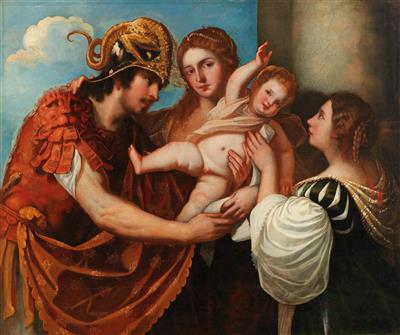Alessandro Varotari, called il Padovanino

(Padua 1588–1649 Venice)
The Departure of Hector’s wife Andromache and his son Astyanax,
oil on canvas, 111 x 131 cm, framed
We are grateful to Bernard Aikema for confirming the attribution after examining the present painting in the original.
Padovanino treated this rare subject in another painting of similar dimensions conserved at the Staatsgalerie in Stuttgart (Inv no. 203) (see U. Ruggeri, Il Padovanino, p. 114, 115, no. 34 ill.) The neo-Titianism expressed in the present painting, the careful study of clothes and hairstyles, together with the preciously decorative character of this Homeric scene, suggest a date of the 1640s. As with other works of this period, Padovanino reveals a particular attention to the expressiveness of the soft facial flesh tones, and the emotional intensity expressed by the characters portrayed by the nervous intertwinement of hands.
Padovanino’s successful revival of 16th century Venetian art was inherited by followers such as Pietro della Vecchia and Giulio Carpioni, His works incorporate a new Baroque grandeur and spaciousness with a vivacity of colour that he had derived from Titian at the start of his career. Among his secular paintings, such as the present work, Penelope Offering the Bow of Ulysses to the Suitors (National Gallery, Dublin) is an excellent example of the learned and esoteric humanist themes of Padovanino’s work, which derived from his association with the most cultivated circles in contemporary Venice, above all with the Accademia degli Incogniti, founded in 1630 and directed by Giovan Francesco Loredan, a leading intellectual. Members of the Accademia degli Incogniti, in fact, such as the Marinisti poets Giacomo Pighetti and Pietro Michiel, owned works by Padovanino, in which they probably appreciated the sophisticated revival of Titian’s style and the refined literary allusion.
The present painting depicts an episode from the sixth book of Homer's Iliad (verses 486-665): Hector, one of the sons of the Trojan king Priam, goes to greet his wife Andromache and son Astyanax. He has returned from the battlefield to incite his mother Hecuba to offer, along with the Trojan matrons, a peplum to the goddess Minerva. The painting portrays the moment when (verses 617-620) the son, frightened by his father's armour and crest, seeks protection in the arms of a nurse.
19.04.2016 - 18:00
- Estimate:
-
EUR 30,000.- to EUR 40,000.-
Alessandro Varotari, called il Padovanino
(Padua 1588–1649 Venice)
The Departure of Hector’s wife Andromache and his son Astyanax,
oil on canvas, 111 x 131 cm, framed
We are grateful to Bernard Aikema for confirming the attribution after examining the present painting in the original.
Padovanino treated this rare subject in another painting of similar dimensions conserved at the Staatsgalerie in Stuttgart (Inv no. 203) (see U. Ruggeri, Il Padovanino, p. 114, 115, no. 34 ill.) The neo-Titianism expressed in the present painting, the careful study of clothes and hairstyles, together with the preciously decorative character of this Homeric scene, suggest a date of the 1640s. As with other works of this period, Padovanino reveals a particular attention to the expressiveness of the soft facial flesh tones, and the emotional intensity expressed by the characters portrayed by the nervous intertwinement of hands.
Padovanino’s successful revival of 16th century Venetian art was inherited by followers such as Pietro della Vecchia and Giulio Carpioni, His works incorporate a new Baroque grandeur and spaciousness with a vivacity of colour that he had derived from Titian at the start of his career. Among his secular paintings, such as the present work, Penelope Offering the Bow of Ulysses to the Suitors (National Gallery, Dublin) is an excellent example of the learned and esoteric humanist themes of Padovanino’s work, which derived from his association with the most cultivated circles in contemporary Venice, above all with the Accademia degli Incogniti, founded in 1630 and directed by Giovan Francesco Loredan, a leading intellectual. Members of the Accademia degli Incogniti, in fact, such as the Marinisti poets Giacomo Pighetti and Pietro Michiel, owned works by Padovanino, in which they probably appreciated the sophisticated revival of Titian’s style and the refined literary allusion.
The present painting depicts an episode from the sixth book of Homer's Iliad (verses 486-665): Hector, one of the sons of the Trojan king Priam, goes to greet his wife Andromache and son Astyanax. He has returned from the battlefield to incite his mother Hecuba to offer, along with the Trojan matrons, a peplum to the goddess Minerva. The painting portrays the moment when (verses 617-620) the son, frightened by his father's armour and crest, seeks protection in the arms of a nurse.
|
Buyers hotline
Mon.-Fri.: 10.00am - 5.00pm
old.masters@dorotheum.at +43 1 515 60 403 |
| Auction: | Old Master Paintings |
| Auction type: | Saleroom auction |
| Date: | 19.04.2016 - 18:00 |
| Location: | Vienna | Palais Dorotheum |
| Exhibition: | 09.04. - 19.04.2016 |
